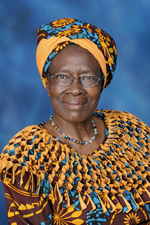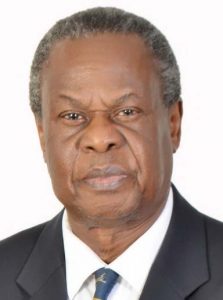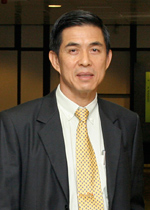This webinar was organized in partnership with the African Centre for Global Health and Social Transformation (ACHEST), Kampala, Uganda. It took place on April 15, 2020.
Transcript This is the verbatim transcript in PDF.
Panelists
- Dr. Miriam Were (Kenya)
- Dr. Francis Omaswa (Uganda)
- Dr. Suwit Wibulpolprasert (Thailand)
More about the panelists
 Professor Miriam Khamadi Were qualified as a Medical doctor from Kenya’s University of Nairobi. Then she received both the Masters and Doctor of Public Health degrees from the Johns Hopkins University in USA. Nationally, Prof Were was a Medical Officer in Kenya’s Ministry of Health and taught Community Health of the Faculty of Medicine, University of Nairobi. Internationally she has been Chief of Health and Nutrition, Representative of the World Health Organisation and Director of the UNFPA Technical Support Team for East, Central and Anglophone West Africa from which she retired in 2000. Post-retirement, she has been Chair of Kenya’s National AIDS Control Council, Chair of the African Medical and Research Foundation Board, Member of the Board of the Health Workforce Alliance, Member of the UN Secretary General’s independent Expert Review Group (iERG) for Women’s and Children’s Health, Champions of AIDS-Free Generation mostly made up of Former African Heads of State. She is the co-Founder of UZIMA Foundation-Africa and was Chancellor of Moi University in Kenya. Among outstanding international honours to Prof Were are HIDEYO NOGUCHI AFRICA PRIZE by Japan and The Queen Elizabeth II Gold Medal for Public Health in the Commonwealth. She has Honorary Degrees from Moi University, Honorary Doctorate from Japan’s Ochanomizu University and Doctor of Humane Letters from DePaul University, USA. She also has Kenya National Honour of Elder of the Burning Spear for outstanding contribution to the nation and is Kenya’s Community Health Strategy Goodwill Ambassador.
Professor Miriam Khamadi Were qualified as a Medical doctor from Kenya’s University of Nairobi. Then she received both the Masters and Doctor of Public Health degrees from the Johns Hopkins University in USA. Nationally, Prof Were was a Medical Officer in Kenya’s Ministry of Health and taught Community Health of the Faculty of Medicine, University of Nairobi. Internationally she has been Chief of Health and Nutrition, Representative of the World Health Organisation and Director of the UNFPA Technical Support Team for East, Central and Anglophone West Africa from which she retired in 2000. Post-retirement, she has been Chair of Kenya’s National AIDS Control Council, Chair of the African Medical and Research Foundation Board, Member of the Board of the Health Workforce Alliance, Member of the UN Secretary General’s independent Expert Review Group (iERG) for Women’s and Children’s Health, Champions of AIDS-Free Generation mostly made up of Former African Heads of State. She is the co-Founder of UZIMA Foundation-Africa and was Chancellor of Moi University in Kenya. Among outstanding international honours to Prof Were are HIDEYO NOGUCHI AFRICA PRIZE by Japan and The Queen Elizabeth II Gold Medal for Public Health in the Commonwealth. She has Honorary Degrees from Moi University, Honorary Doctorate from Japan’s Ochanomizu University and Doctor of Humane Letters from DePaul University, USA. She also has Kenya National Honour of Elder of the Burning Spear for outstanding contribution to the nation and is Kenya’s Community Health Strategy Goodwill Ambassador.
 Dr. Francis Omaswa is the Executive of the African Centre for Global Health and Social Transformation (ACHEST), and chair of the African Health systems Governance Network (Ashgovnet). He co-chairs the Independent Advisory Group to the WHO Director for the African Region. He was Director General of Health Services in the Ministry of Health in Uganda and coordinated major reforms in the health sector. He has a keen interest access to quality health services by rural populations and spent five years testing various approaches for this at the Ngora Mission hospital in Uganda.He has been President, African Platform on Human Resources for Health (APHRH), Special Adviser to the World Health Organization (WHO) Director General and founding Executive Director of the Global Health Workforce Alliance (GHWA). He is founding Director of the Uganda Heart Institute at Makerere University, Uganda; founding President of the College of Surgeons of East, Central and Southern Africa, chair of the GAVI Independent Review Committee, founding Chair of the Global Stop TB Partnership, Chair of the Portfolio and Procurement Committee of the Global Fund Board. He was a member of the steering committee of the High Level Forum on health-related MDGs. He serves on committees and expert panels. Francis Omaswa is a graduate of Makerere Medical School, Uganda and has qualifications in surgery, health services management and medical education.
Dr. Francis Omaswa is the Executive of the African Centre for Global Health and Social Transformation (ACHEST), and chair of the African Health systems Governance Network (Ashgovnet). He co-chairs the Independent Advisory Group to the WHO Director for the African Region. He was Director General of Health Services in the Ministry of Health in Uganda and coordinated major reforms in the health sector. He has a keen interest access to quality health services by rural populations and spent five years testing various approaches for this at the Ngora Mission hospital in Uganda.He has been President, African Platform on Human Resources for Health (APHRH), Special Adviser to the World Health Organization (WHO) Director General and founding Executive Director of the Global Health Workforce Alliance (GHWA). He is founding Director of the Uganda Heart Institute at Makerere University, Uganda; founding President of the College of Surgeons of East, Central and Southern Africa, chair of the GAVI Independent Review Committee, founding Chair of the Global Stop TB Partnership, Chair of the Portfolio and Procurement Committee of the Global Fund Board. He was a member of the steering committee of the High Level Forum on health-related MDGs. He serves on committees and expert panels. Francis Omaswa is a graduate of Makerere Medical School, Uganda and has qualifications in surgery, health services management and medical education.
 Dr. Suwit Wibulpolprasert is a general practitioner, a public health specialist, an administrator and a policy advocator. He began his career as a director and a practitioner in four rural district hospitals in Thailand from 1977 to 1985. Later he was the Director of the Northeastern Public Health College, Director of Technical Division of the FDA, Director of Bureau of Health Policy and Plan, Assistant Permanent Secretary, Deputy Permanent Secretary, and Senior Advisor at the Thai Ministry of Public Health. His main interests are in health policy and planning, and international health. He has been extensively involving in research and development in the areas of human resources for health; health economics and health care financing; international trade and health; health promotion; health information; and pharmaceuticals. He has published more than 100 papers, reports and books locally and internationally. In Thailand, Dr. Suwit is the editor of a local journal for para-medical personnel and had produced radio and television programs on health and social issues for more than 15 years. He is currently the President of the Folk Doctor Foundation; Evaluation Board member of the Thailand Research Fund; and Board member of the Health Systems Research Institute, the Thai Health Promotion Foundation, the National Health Security Board, the Thai Medical Research Council, the National Nanotechnology Centre, the Mahidol University Council, and the National Science and Technology Board. Besides all these works, he has run 8 marathons. For international involvements, he represents Thailand in many international health forums and the World Health Assembly. He also represented Thailand and the South- east Asia Region as a member and Vice Chair of the Governing Board of the Global Fund to Fight AIDS, TB, and Malaria in 2001-2004. He was the President of the Intergovernmental Forum on Chemical Safety in 2003-2006 and a member and Vice Chair of the WHO Executive Board during 2004-2007. He also chaired the Board of the Health Metrics Network in 2006-2007. At present, Dr. Suwit chairs the Steering Committee of Asia Partnership on Avian Influenza Research and the Steering Committee of Asia-Pacific Action Alliance on HRH. He is also a member and Chair of the Program Coordinating Board of the UNAIDS, and member and Chair of the Program and Policy Committee of the interim Board of the Global Health Workforce Alliance. Dr. Suwit served as a Deputy Permanent Secretary of the Thai Ministry of Public Health, in 2000-2003. Currently, he serves at the highest rank of government official (PC11) as a Senior Advisor in Disease Control, after serving as a Senior Advisor in Health Economics during 2003-2006. He is also responsible for health policy and international health works of the ministry.
Dr. Suwit Wibulpolprasert is a general practitioner, a public health specialist, an administrator and a policy advocator. He began his career as a director and a practitioner in four rural district hospitals in Thailand from 1977 to 1985. Later he was the Director of the Northeastern Public Health College, Director of Technical Division of the FDA, Director of Bureau of Health Policy and Plan, Assistant Permanent Secretary, Deputy Permanent Secretary, and Senior Advisor at the Thai Ministry of Public Health. His main interests are in health policy and planning, and international health. He has been extensively involving in research and development in the areas of human resources for health; health economics and health care financing; international trade and health; health promotion; health information; and pharmaceuticals. He has published more than 100 papers, reports and books locally and internationally. In Thailand, Dr. Suwit is the editor of a local journal for para-medical personnel and had produced radio and television programs on health and social issues for more than 15 years. He is currently the President of the Folk Doctor Foundation; Evaluation Board member of the Thailand Research Fund; and Board member of the Health Systems Research Institute, the Thai Health Promotion Foundation, the National Health Security Board, the Thai Medical Research Council, the National Nanotechnology Centre, the Mahidol University Council, and the National Science and Technology Board. Besides all these works, he has run 8 marathons. For international involvements, he represents Thailand in many international health forums and the World Health Assembly. He also represented Thailand and the South- east Asia Region as a member and Vice Chair of the Governing Board of the Global Fund to Fight AIDS, TB, and Malaria in 2001-2004. He was the President of the Intergovernmental Forum on Chemical Safety in 2003-2006 and a member and Vice Chair of the WHO Executive Board during 2004-2007. He also chaired the Board of the Health Metrics Network in 2006-2007. At present, Dr. Suwit chairs the Steering Committee of Asia Partnership on Avian Influenza Research and the Steering Committee of Asia-Pacific Action Alliance on HRH. He is also a member and Chair of the Program Coordinating Board of the UNAIDS, and member and Chair of the Program and Policy Committee of the interim Board of the Global Health Workforce Alliance. Dr. Suwit served as a Deputy Permanent Secretary of the Thai Ministry of Public Health, in 2000-2003. Currently, he serves at the highest rank of government official (PC11) as a Senior Advisor in Disease Control, after serving as a Senior Advisor in Health Economics during 2003-2006. He is also responsible for health policy and international health works of the ministry.